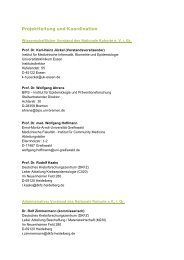Scientific Concept of the National Cohort (status ... - Nationale Kohorte
Scientific Concept of the National Cohort (status ... - Nationale Kohorte
Scientific Concept of the National Cohort (status ... - Nationale Kohorte
You also want an ePaper? Increase the reach of your titles
YUMPU automatically turns print PDFs into web optimized ePapers that Google loves.
C.1<br />
C.1 Annex: Description <strong>of</strong> <strong>the</strong> study centers<br />
Description <strong>of</strong> <strong>the</strong> institutions responsible for establishing and operating <strong>the</strong> study<br />
center<br />
The German diabetes Center (DDZ) incorporates three scientific institutes, <strong>the</strong> Institute for<br />
Clinical Diabetology, <strong>the</strong> Institute for Clinical Biochemistry and Pathobiochemistry, and <strong>the</strong><br />
Institute for Biometrics and Epidemiology. The DDZ – a member <strong>of</strong> <strong>the</strong> Leibniz Association<br />
– is <strong>the</strong> only institution in Germany where interdisciplinary research areas that span from<br />
<strong>the</strong> causes and treatment <strong>of</strong> diabetes to epidemiology and prevention <strong>of</strong> <strong>the</strong> disease and<br />
its complications.<br />
The Institute for Clinical diabetology at <strong>the</strong> DDZ has a special research expertise in<br />
<strong>the</strong> area <strong>of</strong> combining multitracer dilution techniques and multinuclear magnetic resonance<br />
spectroscopy (MRS) to non-invasively study metabolic pathways related to insulin resistance<br />
and glucose metabolism. Toge<strong>the</strong>r with <strong>the</strong> o<strong>the</strong>r institutes it is conducting a large<br />
prospective cohort study <strong>of</strong> newly diagnosed type 2 diabetic patients that includes extensive<br />
phenotyping <strong>of</strong> metabolic traits and early markers <strong>of</strong> diabetic complications. The main<br />
purpose <strong>of</strong> <strong>the</strong> Institute <strong>of</strong> Biometrics and Epidemiology is to generate current populationbased<br />
epidemiologic data on diabetes and its complications. These research goals include<br />
health economics such as cost-effectiveness analyses <strong>of</strong> diabetes prevention. To achieve<br />
its objectives <strong>the</strong> Institute builds its own patient collectives (e.g., a nationwide type 1 diabetes<br />
registry) and uses platforms from external partners to implement diabetes-related<br />
research questions (KORA, SHIP). The Institute also has experience in establishing and<br />
analyzing large epidemiologic databases.<br />
The Iuf – leibniz research Institute for Environmental medicine – major expertise is<br />
available in molecular preventive medical research in <strong>the</strong> area <strong>of</strong> environmental health. Molecular<br />
mechanisms <strong>of</strong> premature aging and degenerative diseases and environmentally induced<br />
impairment <strong>of</strong> immune reactions, especially allergies, are in <strong>the</strong> center <strong>of</strong> IUF's work.<br />
At <strong>the</strong> moment, research activities mainly focus on two environmental noxae: particles and<br />
nonionizing radiation. The internal scientific structure <strong>of</strong> IUF results from <strong>the</strong> cooperation <strong>of</strong><br />
at present six working groups “cell biology“, “molecular immunology“, “molecular toxicology”,<br />
“particle research“, “epidemiology“, and “molecular aging research“. The working group<br />
“epidemiology” focuses on investigating <strong>the</strong> pathogenesis and development <strong>of</strong> respiratory<br />
diseases and allergies in children and premature aging processes and associated diseases<br />
(skin aging, COPD). The group has long-standing experience in conducting and analyzing<br />
epidemiologic studies, beginning in <strong>the</strong> 1970s.<br />
Description <strong>of</strong> <strong>the</strong> study center Duesseldorf<br />
The recruitment <strong>of</strong> 10,000 study participants will take place in Duesseldorf, including inhabitants<br />
<strong>of</strong> <strong>the</strong> city <strong>of</strong> Duesseldorf (584,000 inhabitants in 2010). A total <strong>of</strong> 2,000 individuals<br />
will receive an extensive examination (e.g., including MRI and digital imaging <strong>of</strong> extrinsic<br />
skin aging). The study center will be located at <strong>the</strong> DDZ and will be run toge<strong>the</strong>r with <strong>the</strong><br />
IUF, which is located nearby. The DDZ can be easily reached by public transportation and is<br />
close to <strong>the</strong> main central railway station <strong>of</strong> Duesseldorf (10–15 min). The DDZ study center<br />
will comprise rooms for interviews, examinations, preparation, and storage <strong>of</strong> biosamples<br />
(in total covering more than 500 m2). The various existing facilities at <strong>the</strong> DDZ and IUF<br />
(MRI/MRS, technical laboratory, clinical study center, data management, quality control,<br />
training and supervision <strong>of</strong> investigators) will be embedded in <strong>the</strong> infrastructure.<br />
244



